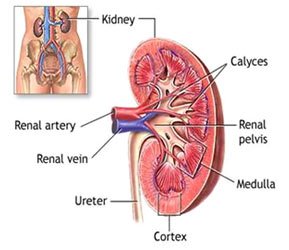Kidney disorders at an early age have long-term effects
Until recently, the medical community still believed that the state of kidney failure will disappear after puberty; But according to a new published study in the Journal of the American Society of Nephrology (CJASN), it will persist until adulthood and cause significant long-term effects. The study also shows that more effective treatments are needed for children with this disorder.
Many children with kidney failure syndrome - a type of disorder that greatly affects kidney dialysis structures - can be successfully treated with prednisone. The cause of this symptom is still unclear, but it may be related to autoimmune ability. Unfortunately, 10 to 40% of patients relapse when they are over the age of a child and need long-term treatment with immunosuppressive drugs.
 Picture kidney. According to scientists, kidney disorders when young leave long-term consequences. (Photo: ArihantKidneyCure)
Picture kidney. According to scientists, kidney disorders when young leave long-term consequences. (Photo: ArihantKidneyCure)
To determine the long-term health effects of this renal failure as well as treatment in untreated patients as children, Dr. Henriette Kyreileis, MD, from the Medical Center Nijmegen, Radboud University, Netherlands and PhD, Dr. Elena Levtchenko from Leuven University Hospital, Belgium, and colleagues examined 15 adult patients.Researchers have conducted a number of surveys on patients - including blood and urine analysis, male sperm tests, x-rays, eyes, and genome surveys.
Hypertension was detected in 7 of 15 patients, and osteoporosis was present in 5 people. Regarding eye examination results, 10/15 patients with myopia and 3 people have cataracts. 1 in 8 male participants in the study had low sperm count, in 4 weak sperm sperm, and in 6 poor quality semen patients.
The analysis also revealed that although well-treated adults maintain normal kidney functions, they often face other serious health problems. Treatment with long-term immunosuppressants may be part or all of the causes of these adverse effects.'Our study emphasizes that less toxic and more effective therapy is needed for recurrent renal syndrome,' the authors conclude.
- Long-term gastrointestinal disorders in the weak abdomen
- Air pollution causes an increase in kidney disease
- Work related reasons make you die early
- 3 warning signs of inflammatory kidney disease, not to develop into kidney failure you are new
- Smoking during pregnancy causes long-term effects
- Kidney stones are not frozen but continuously dissolve and develop
- What if people live with only one kidney until the end of their lives?
- All you need to know about kidney stones
- Long-term exposure to Alzheimer's susceptible pesticides
- New hope for kidney failure
- New method for early detection of kidney disease
- Be careful with the side effects of watermelon
 Green tea cleans teeth better than mouthwash?
Green tea cleans teeth better than mouthwash? Death kiss: This is why you should not let anyone kiss your baby's lips
Death kiss: This is why you should not let anyone kiss your baby's lips What is salmonellosis?
What is salmonellosis? Caution should be exercised when using aloe vera through eating and drinking
Caution should be exercised when using aloe vera through eating and drinking